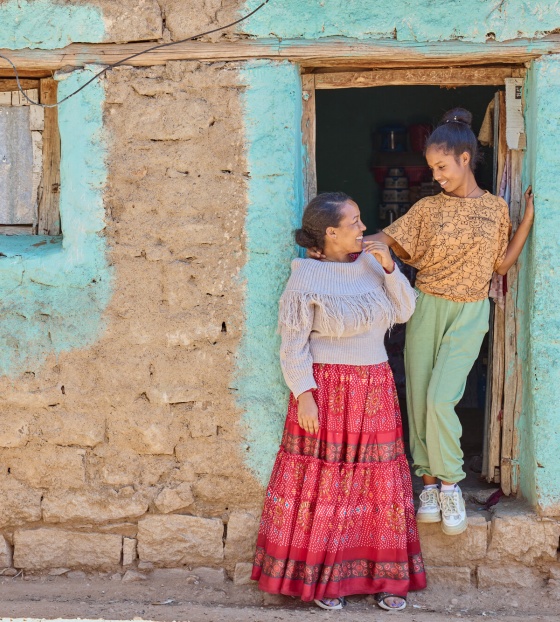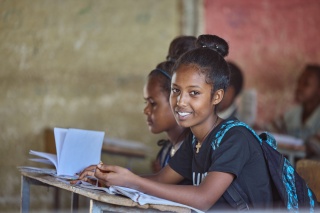

A mother and daughter who never give up
Shona Shea, Head of Media and Content at Mary's Meals UK, reflects on two meetings with Lydia and her mother, Shewit, in Ethiopia.
Education is for everyone
When I first met Lydia more than five years ago, the first thing I noticed was her smile. She stood out from the other children with a bright red head scarf and a sassy personality. She dreamt of being a pilot, her confidence beaming through as she described her love of reading and her joy at receiving Mary’s Meals.
Her confidence came from her mother, Shewit. A teacher at the school, Shewit was clearly a role model for all of the young female pupils and a fierce advocate for them too. Speaking back then, she told me:
“My parents didn’t want me to go to school but my daughter doesn’t need to face such things.
“Before, there was a push by the family to get married because they didn’t think girls can achieve anything or even be educated. Now there is no such thinking about girls… females can achieve their goals if they are educated.”
Lydia believed in the power of education too, telling me, then aged just 11, that: “Education makes us perfect. If we do not educate, we cannot save our country and we cannot be in a safe place. I hope all of us will decide the future of our country.”
A renewed hope despite trauma
Her youthful optimism couldn’t have predicted the devastating years that followed. Nobody could. After years of dreadful conflict that closed schools and killed hundreds of thousands of civilians, and an awful drought that ravaged the fields already torn apart by war, I returned to meet a more serious 16-year-old Lydia. The war still cast a long shadow as she heartbreakingly spoke of the hope and promise it stole from her.
Despite this trauma, Shewit never let Lydia give up.
She told me: “My mother constantly encourages me and reminds me of my worth, preventing me from falling into despair.”
That renewed hope came from Mary’s Meals as the schools reopened too:
“Education empowers us to contribute positively to our country. Without the feeding programme, we would struggle to focus on our studies due to hunger. However, with the meals, we are more alert and motivated. When you eat and learn, you become attentive and understand what the teacher is teaching you.”
As a teacher, Shewit has seen the benefits of the programme beyond the impact on her own daughter: “If it weren't for this feeding programme, I can't even begin to imagine what would happen to us. Mary’s Meals serves as a lifeline for our community. It brings us immense joy. Without it, the students wouldn't have the opportunity to learn. Some might resort to begging, others to work, or find themselves in unnecessary places, leading to various problems.
“Since food is a fundamental human necessity, it not only benefits the students but also their parents and the entire community. There's no talk of dropping out anymore. [Students] actively engage in class discussions and enjoy themselves without experiencing exhaustion. This feeding programme motivates them to come to school rather than giving them reasons to stay away.”
Education transforms lives

Thankfully Lydia doesn’t have to try and convince her mother that education matters, but many of her peers do. Girls often face additional barriers to education, expected to look after the household or other family members, they may have to work to ease financial burdens, extreme poverty may force them into early marriage or teenage pregnancy. These are just some of the reasons why women and girls now account for 60% of those living in hunger worldwide.
Mary’s Meals believes education is for everyone. We are proud that 50% of those who eat Mary’s Meals at school are girls. By providing a daily school meal, we are helping to remove those barriers to education, motivating parents to send their daughters to school, and enabling them to focus on their studies because they’re not concentrating instead on a gnawing hunger in their stomachs.
Education has the power to transform girls’ lives and lift communities out of poverty. As a teacher, Shewit tells us:
“Educating a girl means you educate the whole family. Girls are close to the whole family because they become the mother, and then they have a big chance to change the whole family.”
And as a mother, she explains:
“Through constant motivation and encouragement, I am confident that Lydia will persevere and achieve her goals, and I eagerly anticipate celebrating her accomplishments with pride.”
Please consider donating to Mary’s Meals, to ensure more teachers like Shewit have a classroom full of energetic, attentive pupils and more girls like Lydia have a chance to fulfil their dreams.
